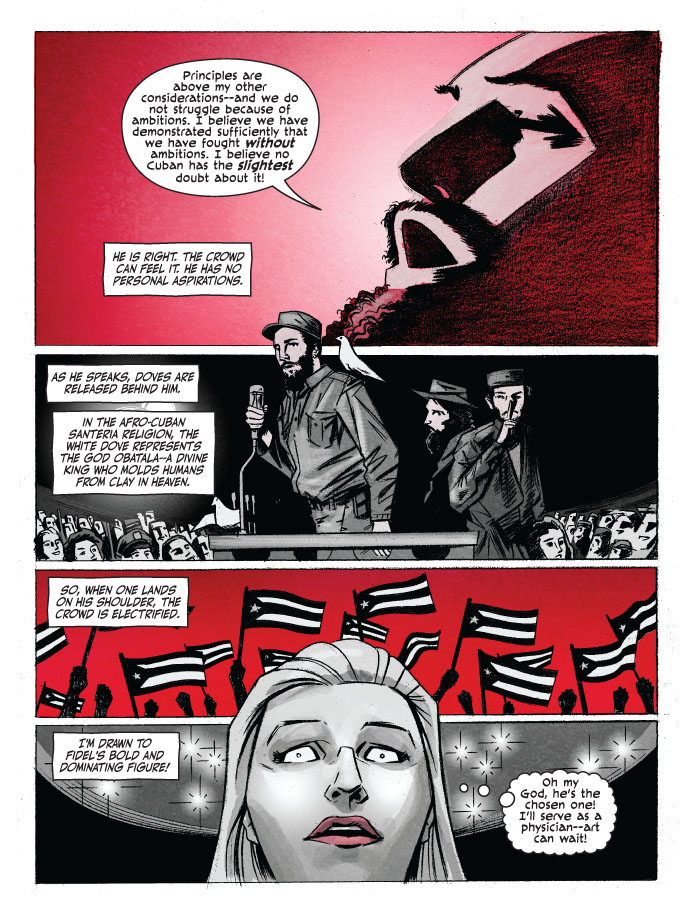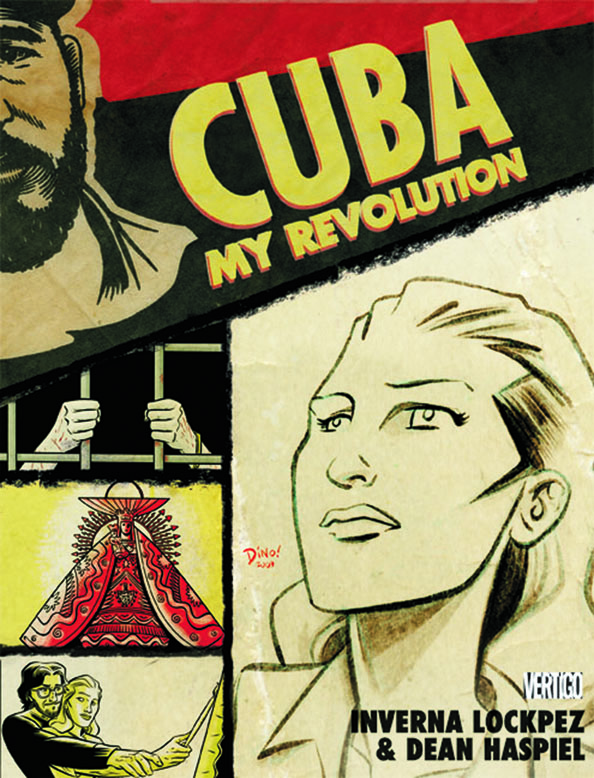Written by Inverna Lockpez
Art by Dean Haspiel
Colors by Jose Villarrubia
Letters by Pat Brosseau
$24.99 / 144 Pages / Two-Color
Vertigo Comics
Suggested for Mature Readers
For the sake of full disclosure, I must admit that much of my knowledge of Cuba and its history is painted by I Love Lucy and a collegiate screening of Mikhail Kalatozov's mesmerizing Soviet/Cuban film Soy Cuba ("I Am Cuba"), which was, to me, like a kind of New Wave science fiction. I know it is a troubled place, an otherwise sunny island in constant struggle with the shadow of its own past. I know that Fidel Castro has a synthetic rectum. I know that in my childhood playing whiffle ball, I made jokes about rafts that I did not at that time fully understand. I know the bullet points of communism, the peculiar history of a Cold War and of my own country sponsoring the revolutions of others. If I had to summarize my shallow, ignorant, first world understanding of the place that is Cuba, I'd simply say that it is a beloved and beautiful country that, through a confluence of factors internal and external, has become a place from which to escape. Though it is also, in my experience, a place to which one might wish to escape. A destination. All I really know is that I don't know Cuba at all.
Inverna Lockpez does know Cuba, does love Cuba. She lives in America now, but Cuba is where she began and it is clear that it will always help define her in some way. Cuba: My Revolution is her semi-autobiographical graphic memoir, a testimony of how a nation's strife often shapes one's own. Lockpez is a visual artist, so it only makes sense that her story be told through images, though Lockpez turned to another illustrator, Dean Haspiel, to draw from her words.
 The story begins in December of 1958 when Cuban-born Sonya is 17. Castro waits in the mountains and President-dictator Batista's private planes hum constantly hum with life, ready to make a swift departure. Sonya is an activist, a staunch devotee of Castro and all he represents. She is an artist, though her mother wants her to pursue medicine. Revolution ignites, and Sonya ultimately decides that the best she can do to help her new leader is to become a surgeon. Her father is among the last doctors in Cuba. She finds herself serving on the battlefield, no longer just a proponent for political change, but a pawn in the violent conflict such ideologies entail. She is eventually captured and brutally tortured by her own countrymen, a harrowing turning point that alters many of her relationships, most of all her understanding of revolution. Though a gifted and dedicated surgeon, she remains artistically driven. But is this communist nation she's long supported open to her expression? Does art overtake violence and oppression, or is it born out of such things?
The story begins in December of 1958 when Cuban-born Sonya is 17. Castro waits in the mountains and President-dictator Batista's private planes hum constantly hum with life, ready to make a swift departure. Sonya is an activist, a staunch devotee of Castro and all he represents. She is an artist, though her mother wants her to pursue medicine. Revolution ignites, and Sonya ultimately decides that the best she can do to help her new leader is to become a surgeon. Her father is among the last doctors in Cuba. She finds herself serving on the battlefield, no longer just a proponent for political change, but a pawn in the violent conflict such ideologies entail. She is eventually captured and brutally tortured by her own countrymen, a harrowing turning point that alters many of her relationships, most of all her understanding of revolution. Though a gifted and dedicated surgeon, she remains artistically driven. But is this communist nation she's long supported open to her expression? Does art overtake violence and oppression, or is it born out of such things?
Lockpez paints a vivid picture of a country and its problems by first telling a very personal story of self discovery. Sonya comes of age as her country transforms itself. She's part of the transition and that, in turn, shapes her own story. This is pretty important document, and one that has shed some light on what it's like on the other side of an ocean. She's not rallying in the park or even pounding against the gates. She's in there. This is her life. This is how she must base her decisions. She understands freedom much more acutely than I likely ever will.
This is Lockpez's first comic, and as such, it does not always make the most of the medium. The dialogue can often feel stiff and expositional, but this is a big story and a history lesson. Not a slice of life, but a biopsy. She makes very good choices and offers a number of chilling insights, but ultimately this is not as transcendant as, say, Maus. But the fact that I'm even thinking of Maus should also say something. For Haspiel's part, he lends great expression to what is, essentially, the story of someone else's life. A sweeping story full of information and…time. Haspiel treats the characters with the same humanity as he would his own acquaintances. Aside from some distracting storytelling choices–a floating head for off-panel dialogue, some geometrically strange page layouts–he tells this story he's been charged with effectively, and I often forgot this was not the work of one person.
This is a valuable story about a section of the world that could use a little more definition, even if the question is too large for one book. It's also a very good life story that falls a little short of the best in the biographical comics genre.
(Out of 5)



But is it as good as ‘Dirty Dancing: Havana Nights’?
(Seriously, this looks very interesting. Thanks for another great review.)
Paul, thanks for the review. I was really interested in this, but I balked at the 24.99. Still loks like a worthy read, and the content should be an easy argument for my library to get it!
Great review. I’ve been thinking a lot lately about how comics, especially memoirs, are one of the best media for learning about other cultures, and this sounds like another worthy addition to my to-read list.
I’ve always been fascinated by this time period in Cuba, especially the Brigade 2506’s battle at the Bay of Pigs. Some of the stuff that happened just sounds crazy and sounds like it would be an awesome story to see. So, hearing a first-hand real-life account of early Castroite Cuba sounds like a great read.
Thank you.
Thanks so much for reviewing this, Paul; I’ve been looking forward to this book’s release ever since it was announced.
Believe it or not it will be my first Haspiel read ever, so I’m looking forward to it even all the more in light of that
As a history buff, I wanted to say that I quite enjoyed this book, probably a little bit more than Paul did. I really liked the perspective her story offered, and I’ve never seen a first hand account of the events in the book.